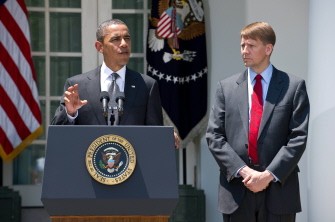WASHINGTON, July 18, 2011 (AFP) - With just two weeks to avert a ruinous debt default, top US senators worked on a bipartisan back-room compromise Monday as the White House's Republican foes set up symbolic votes on an austerity plan.
"We're making progress," President Barack Obama told reporters a day after unannounced talks at the White House Sunday with Republican House Speaker John Boehner and Republican House Majority Leader Eric Cantor.

"The lines of communications are being kept open. But there is nothing to report in terms of an agreement or progress," Boehner communications director Kevin Smith said after confirming the secret meeting.
As a new poll showcased deep US public disgust with politicians' handling of the standoff, US Treasury Secretary Timothy Geithner sought to reassure skittish markets that polarized Washington would rally behind an 11th-hour deal.
"Despite what you hear -- and this is a complicated place, Washington -- people are moving closer together," he told CNBC television, saying a default would bring the world economy to "the edge of recession."
Geithner praised a plan being forged in private by Democratic Senate Majority Leader Harry Reid and Republican Senate Minority Leader Mitch McConnell that would give Obama broad powers to raise the debt ceiling.
The blueprint, described last week by aides who warned it was still in flux, would effectively let Obama do so with just Democratic votes while letting Republicans oppose the move with political but few practical consequences.
The plan would also call for as much as $1.5 trillion in spending cuts over ten years and set up a special commission of lawmakers empowered to propose more cuts that would get streamlined congressional consideration.
White House spokesman Jay Carney said Obama still hoped to combine deep deficit cuts with a debt-limit increase in "the biggest deal possible" but suggested the president could back the "last-ditch" Reid-McConnell plan with time running short.
"Why don't we wait and see how things look in a few days, or maybe even on Friday," said Carney.
Republicans close to the "Tea Party" movement have angrily condemned the compromise but appeared unable to block it, even as they forced a House vote on Tuesday on tying the debt ceiling to draconian spending cuts as well as amending the US Constitution to required a balanced federal budget.
That plan was seen as dead on arrival in the Democratic-held Senate.
And Obama's budget office issued a withering veto threat urging Republicans to abandon "an empty political statement and unrealistic policy goals."
Boehner called that message "disappointing" and warned: "If we are going to raise the debt limit and avoid default, the White House must be willing to demonstrate more courage than we have seen to date."
Washington hit its debt ceiling on May 16 and has used spending and accounting adjustments, as well as higher-than-expected tax receipts, to continue operating normally, but can only do so until August 2.
Finance and business leaders have warned that failure to raise the US debt ceiling by then could send shock waves through a world economy still reeling from the 2008 collapse, while Obama has predicted economic "Armageddon."
Showing little concern yet over the raging battle, investors snapped up new issues of short term Treasury securities - $51 billion in 13- and 26-week bills - on Monday at even lower interest rates than those paid just weeks earlier.
But analysts say that US bond investors could begin showing the strain at Treasury auctions in the final days of July.
Democratic Senate Majority Leader Harry Reid announced that the Senate would be in session every day, including weekends, until it passes legislation to raise the debt ceiling.
Obama, whose 2012 reelection bid will turn on his handling of the US economy, won good marks from just 43 percent of the US public for his approach to the debt standoff, while 48 percent disapproved, according to a CBS television poll.
But he fared better than Republicans, who faced 71 percent disapproval to just 21 percent approval for their role in the political struggle, according to the survey, which had an error margin of plus or minus four percentage points.
A final deal was all but certain to exclude Obama's sought-for tax hikes on the rich and wealthy corporations, allowing him to run through 2012 on that broadly popular proposal.
Republicans have argued that tax hikes would smother investment that feeds job growth at a time when the US economy faces stubbornly high unemployment of 9.2 percent.







)
















